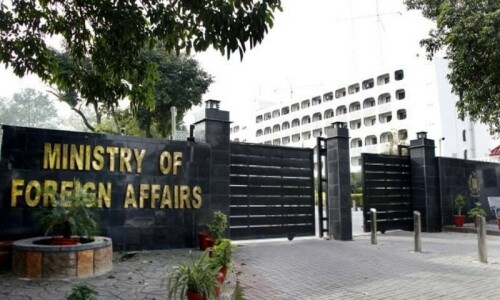PESHAWAR: Expunging the negative remarks about the competence of senior lawyer Mohammad Tariq Afridi from a parliamentary committee’s report on the rejection of his nomination as an additional high court judge, a Peshawar High Court bench has ordered the placing of the case before the Judicial Commission of Pakistan for consideration.
However, Justice Lal Jan Khattak and Justice Syed Mohammad Attique Shah declared the last year rejection of the lawyer’s nomination by the parliamentary committee ‘within its constitutional mandate’.
The bench had disposed of on Mar 5 a petition filed by Tariq Afridi who had requested the court to declare the decision of the Parliamentary Committee of July 8 of rejecting recommendations of the Judicial Commission in respect of the petitioner not in accordance with the provision of Constitution and therefore, void.
The court has now released its detailed judgment wherein the bench has quoted an earlier judgment of the Supreme Court of Pakistan and ruled: “In light of the above referred judgment, findings of the Committee regarding the petitioner’s professional skills and competence are beyond its constitutional mandate, therefore, same cannot be countenanced, hence we are constrained to expunge such findings of the Committee from its decision.”
“From the above discussion, we are of the humble view that while rejecting the petitioner’s nomination and sending its decision to the Commission, the Committee has acted within its constitutional mandate to which no exception could be taken by this court but so far its findings on the petitioner’s professional competence and compromising attitude, as mentioned in its decision, are concerned, suffice it to say that same are far beyond its mandate,” the bench ruled.
Expunges negative remarks about his competence from panel report
The court further ruled: “Upshot of the above discussion is that findings of the Committee regarding the petitioner’s incompetency and lack of professionalism are hear by expunged from its decision whereas its decision qua sending the petitioner’s case to the Commission for its confirmation or otherwise in terms of the 2nd proviso to clause (12) of Article 175-A of the Constitution is maintained.”
The bench directed that the secretary of the Commission shall place the petitioner’s case before the Commission in terms of the 3rd proviso to clause (12) of Article 175-A of the Constitution.
The bench ruled that the committee was empowered not to confirm the nomination so sent by the JCP, however, discretion of the committee not to confirm the commission’s nomination was subject to the condition that for non-confirmation it had to give reasons.
“Once the commission’s nomination is not confirmed by the Committee with reasons, then its job is over where after the matter will come back to the Commission in terms of 2nd proviso to clause (12) of Article 175-A of the Constitution,” the bench ruled adding that the Commission again will take up its nomination and if this time the Commission confirms its earlier nomination, which was not confirmed by the Committee, then such confirmation will be sent straight to the President for issuance of formal notification of appointment of the recommended person.
The court ruled that the 3rd proviso had increased the commission’s power when its nomination comes back to it from the committee through the Prime Minister after it has not been confirmed.
In such like scenario, the bench ruled, the Commission not only acts as a recommendatory body but as a confirmatory body too and in case it confirms its earlier nomination then it will send its confirmation directly to the President for issuance of the appointment order. It is added that the Commission will send another nomination to the Committee in case it does not confirms nomination of its nominee rejected by the Committee.
Senior lawyers Qazi Mohammad Anwar and Abdus Samad Khan had appeared for the petitioner and said the JCP in its meeting on Jul 2, 2019, had recommended the petitioner and four others for their appointments as additional judges of the high court and had sent the recommendations to the parliamentary committee for confirmation.
They, however, said the parliamentary committee only confirmed the other four nominees whereas nomination of the petitioner was rejected and as a result his case was forwarded to the commission through the prime minister.
The lawyers said before nominating the petitioner as an additional judge, the commission had examined his legal and professional skills, legal acumen, intelligence and capability in depth and the committee couldn’t take a view different from the commission’s.
They said the committee had no powers to veto the JCP’s decision.
Published in Dawn, March 14th, 2020









































